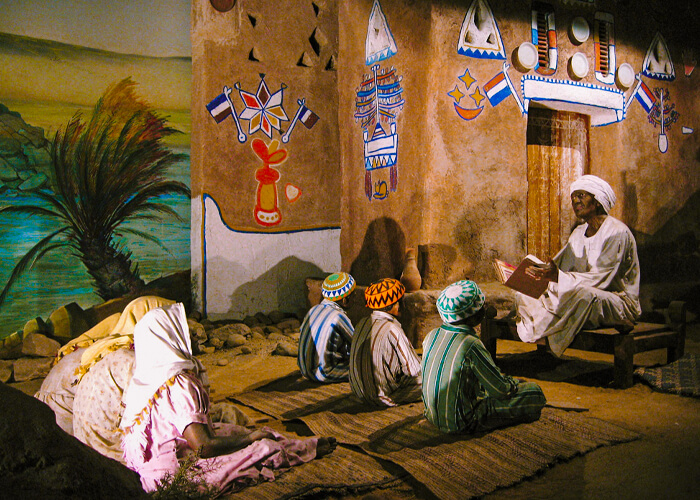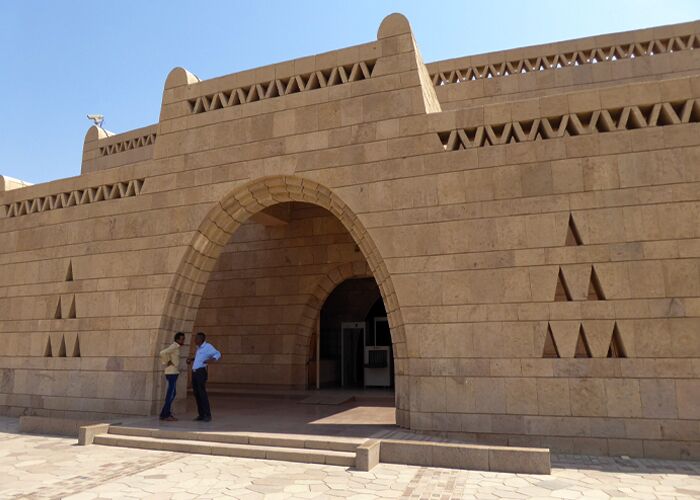Nubian Museum: A Gateway to Egypt’s Rich Nubian Heritage
The Nubian Museum in Aswan is one of Egypt’s most treasured cultural sites. For those exploring Egypt’s ancient history, this museum is a must-visit, offering a fascinating glimpse into the life, culture, and history of the Nubian people. With a diverse collection of artifacts, artwork, and exhibits, the Nubian Museum Aswan presents the region’s rich cultural heritage, from ancient times to the present day.
Whether you’re a history buff, an art lover, or someone intrigued by the complexity of Egypt’s ancient cultures, the Nubian Museum Aswan Egypt provides an enriching experience that you’ll treasure long after your visit. In this article, we’ll explore the museum’s history, exhibits, its significance to Nubian culture, and provide useful tips to make the most out of your visit to this iconic site.
History and Significance of the Nubian Museum Aswan
The Nubian Museum was opened in 1997 to celebrate the ancient and modern history of the Nubian people. The museum was established in response to the cultural and historical preservation needs of the Nubian heritage, which faced threats due to the construction of the Aswan High Dam and the creation of Lake Nasser in the 1960s. The construction of the dam flooded large swaths of Nubian land, displacing entire communities and submerging many important archaeological sites. The creation of the museum was a vital effort to preserve the rich culture of the Nubian people and ensure that their history is not forgotten.
The Nubian Museum Egypt stands as a tribute to the region’s ancient roots, with displays that span from prehistoric times to the modern-day lives of Nubians. The museum not only highlights ancient artifacts, but it also shares the stories of the Nubian people, whose culture has been intertwined with Egypt’s civilization for millennia.

What is Nubian Culture?
Understanding Nubian culture Egypt requires a look back at one of the oldest continuous cultures in the world. Nubia, located in the southern part of Egypt and northern Sudan, is a region rich in history and culture. Nubians were once known for their powerful kingdoms, such as the Kingdom of Kush, which ruled Egypt for centuries, and the Nubian pharaohs, who ruled Egypt during the 25th dynasty.
Nubian architecture is another standout feature of the culture. Traditional Nubian homes, characterized by their unique mud-brick structures and domed roofs, are designed to withstand the heat of the desert while providing natural cooling. Many of these buildings are still in use today, and their beauty and functionality are celebrated by Nubians and visitors alike.
Nubian culture also includes vibrant music, dance, and art, with influences seen throughout the museum’s exhibits. It’s a culture marked by a deep connection to the Nile River, which played a vital role in the daily life of Nubians for thousands of years.
What Can You Expect to See at the Nubian Museum in Aswan?
The Nubian Museum Aswan boasts an extensive collection of items that span the full scope of Nubian history, from ancient civilizations to contemporary times. Here are a few highlights:
-
Ancient Artifacts: The museum houses a wide range of objects from ancient Nubia, including pottery, jewelry, and statues. These artifacts reveal the technological innovations and artistic achievements of the Nubian people.
-
Pharaonic and Meroitic Exhibits: The museum features items from the Kingdom of Kush, the ancient Nubian kingdom that ruled over Egypt during the 25th dynasty. There are also artifacts from the Meroitic period, showcasing the artistic and architectural prowess of the Nubian civilization.
-
Themed Halls: The museum is divided into several themed halls, each dedicated to a specific aspect of Nubian culture. These include halls focused on Nubian art, religion, and social life.
-
Modern Nubian Culture: The museum also delves into the contemporary life of Nubians, with exhibits on the Nubian villages, music, and daily life in modern Nubian communities.
-
Artifacts from Lake Nasser: Many objects from ancient Nubia were submerged by the creation of Lake Nasser. The museum houses several of these waterlogged artifacts, preserving them for future generations to study and admire.

Visiting the Nubian Museum Aswan: Practical Information
When planning your visit to the Nubian Museum Aswan, it’s important to have the following information to ensure a smooth and enjoyable experience.
Opening Hours
The Nubian Museum Aswan opening hours typically run from 9:00 AM to 7:00 PM, with last entries allowed at 6:30 PM. However, it’s always advisable to check for any changes in schedule or maintenance closures before your visit.
Ticket Prices
The Nubian Museum Aswan ticket price varies, but generally, the entry fee for adults is affordable. There are often discounts for students and children, making it a great family destination.
Getting There
The Nubian Museum in Aswan is centrally located and easy to access. If you’re staying in Aswan, you can reach the museum by taxi, walking, or as part of a guided tour. It’s a short distance from the Aswan city center and can be visited in combination with other local attractions like the Philae Temple or the Aswan High Dam.
The Nubian Villages: A Living Legacy of Nubian Culture
In addition to visiting the Nubian Museum Aswan Egypt, travelers often find it fascinating to visit the Nubian villages that lie along the banks of the Nile. These villages offer a unique insight into Nubian life, where ancient traditions blend seamlessly with modern influences.
The guide to the Nubian villages will take you through vibrant communities where the architecture, lifestyle, and customs have been preserved for generations. Many of these villages have beautifully painted houses, and you’ll have the chance to experience the warmth and hospitality of the Nubian people.
Visiting the Nubian village is an opportunity to engage with local artisans, taste traditional Nubian cuisine, and explore the scenic Nile shores. Many tours include boat rides to these villages, providing a peaceful and picturesque journey through the waters that have sustained Nubian life for centuries.
Nubian Museum Aswan: Key Facts You Should Know
-
Location: The Nubian Museum Aswan is located in Aswan, Egypt, close to many other significant historical sites, including the High Dam and Philae Temple.
-
Architectural Design: The building itself is a marvel of modern Egyptian architecture, blending traditional Nubian styles with contemporary design. The museum’s structure is designed to complement the surrounding environment, offering stunning views of the Nile.
-
Cultural Importance: The Nubian museum Egypt plays a key role in preserving and sharing the cultural and historical significance of the Nubian people, who have long been an integral part of Egyptian civilization.
-
Educational Programs: The museum hosts various educational programs and events aimed at raising awareness about Nubian history and culture. These programs are designed for visitors of all ages and offer a deeper understanding of the rich heritage of the Nubian people.
The Nubian Planet: Beyond the Museum
The Nubian Planet is a term often used to describe the expansive influence and reach of Nubian culture. While the Nubian Museum Aswan is a major cultural hub, the Nubian legacy extends beyond this singular space. From the Nubian villages that dot the landscape to the stories passed down through generations, the Nubian planet is an ever-evolving culture that continues to thrive.
For travelers looking to experience more than just a visit to the museum, engaging with Nubian culture through local interactions and excursions will provide a deeper connection to the region’s history and people. A trip to Nubia is not just about viewing artifacts but about experiencing the culture firsthand, in the landscapes, music, and people that make this area of Egypt so special.
Conclusion: Why Visit the Nubian Museum in Aswan?
The Nubian Museum Aswan is a treasure trove of history and culture, offering visitors an immersive journey into the heart of Nubian civilization. From ancient artifacts and breathtaking architecture to vibrant depictions of modern Nubian life, the museum captures the essence of a people whose history spans millennia. Whether you are a lover of history, art, or culture, the Nubian Museum Aswan is an unmissable destination in Egypt.
With its educational exhibits, captivating stories, and rich collection of artifacts, the museum not only preserves the memory of Nubian heritage but also celebrates the ongoing vibrancy of the Nubian people today. For travelers looking to explore Egypt’s deep and diverse history, a visit to the Nubian Museum Aswan is a step into a world of ancient civilizations, stunning art, and timeless cultural legacy.

